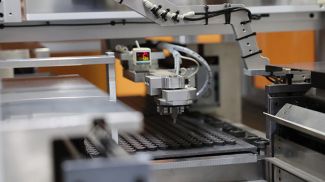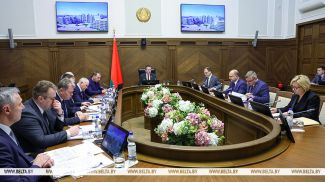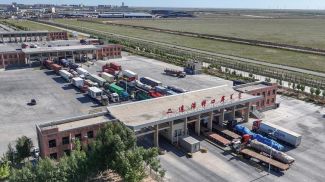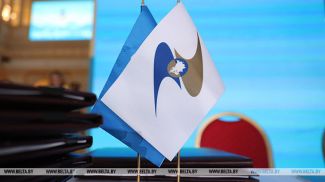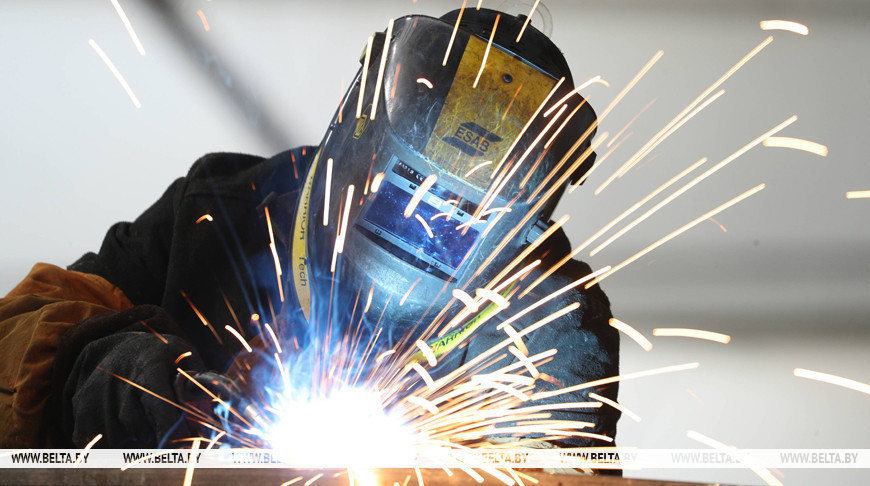
MINSK, 20 May (BelTA) - Belarus' industrial output has increased by 13% over the last two years, First Deputy Chairman of the Belarusian national association of industrial enterprises BelAPP Aleksandr Panasiuk, said at the second business conference "Belarus’ industrial sector: Export, import independence, effective management" in Minsk, BelTA learned.
The conference touches upon fundamentally important things: expansion of technological capabilities of the industrial sector, export potential, managerial personnel and their competencies. "These tasks have to be addressed in difficult conditions of the unprecedented sanctions and restrictions, taking into account the destruction of the free market and unimpeded movement of goods mechanism. On the one hand, companies encounter additional risks and costs, but on the other hand, this creates opportunities to develop and manufacture their new products," Aleksandr Panasiuk emphasized.
The figures speak to this. "In the last two years alone, industrial output has increased by 13%. The manufacturing sector has contributed 8.1% to the GDP growth over this period. Our enterprises also posted an 8% increase in fixed capital investment last year. This means that the renewal of production and technological base is underway," the first deputy chairman said. “These figures were achieved in the difficult conditions. The enterprises rebuilt their export strategies and took advantage of the withdrawal of foreign companies, primarily from the Russian market. On the back of the agreement on the common industrial policy with Russia, taking into account the competencies of the parties, Belarusian companies in cooperation with Russian colleagues are implementing 28 investment projects. It should be noted that they are both import-substituting and export-oriented.”
Cooperation with Russia in microelectronics with the participation of Integral, Planar provided an opportunity to resume the production of new component base, Aleksandr Panasiuk said. "Integral has received the State Quality Mark for its products, which confirms the competence of our enterprise,” he noted. “In aircraft construction, there is a joint program to build a 19-seat aircraft. In the machine tool industry, the development of high-precision machining centers and grinding gear machining centers is underway. Other promising projects include the construction of a plant for unmanned aircraft systems and a data center. New major joint initiatives aimed at strengthening technological sovereignty are in the pipeline.”
Today, cooperation with geographically distant countries is gaining momentum. "We see that this work is becoming more active. This is confirmed by the recent visit of delegations from Vietnam, Zimbabwe and other countries to Belarus. Practical work of the industrial sector to implement strategic priorities will undoubtedly contribute to ensuring sustainable and balanced growth of the country's economy," he concluded.
The conference touches upon fundamentally important things: expansion of technological capabilities of the industrial sector, export potential, managerial personnel and their competencies. "These tasks have to be addressed in difficult conditions of the unprecedented sanctions and restrictions, taking into account the destruction of the free market and unimpeded movement of goods mechanism. On the one hand, companies encounter additional risks and costs, but on the other hand, this creates opportunities to develop and manufacture their new products," Aleksandr Panasiuk emphasized.
The figures speak to this. "In the last two years alone, industrial output has increased by 13%. The manufacturing sector has contributed 8.1% to the GDP growth over this period. Our enterprises also posted an 8% increase in fixed capital investment last year. This means that the renewal of production and technological base is underway," the first deputy chairman said. “These figures were achieved in the difficult conditions. The enterprises rebuilt their export strategies and took advantage of the withdrawal of foreign companies, primarily from the Russian market. On the back of the agreement on the common industrial policy with Russia, taking into account the competencies of the parties, Belarusian companies in cooperation with Russian colleagues are implementing 28 investment projects. It should be noted that they are both import-substituting and export-oriented.”
Cooperation with Russia in microelectronics with the participation of Integral, Planar provided an opportunity to resume the production of new component base, Aleksandr Panasiuk said. "Integral has received the State Quality Mark for its products, which confirms the competence of our enterprise,” he noted. “In aircraft construction, there is a joint program to build a 19-seat aircraft. In the machine tool industry, the development of high-precision machining centers and grinding gear machining centers is underway. Other promising projects include the construction of a plant for unmanned aircraft systems and a data center. New major joint initiatives aimed at strengthening technological sovereignty are in the pipeline.”
Today, cooperation with geographically distant countries is gaining momentum. "We see that this work is becoming more active. This is confirmed by the recent visit of delegations from Vietnam, Zimbabwe and other countries to Belarus. Practical work of the industrial sector to implement strategic priorities will undoubtedly contribute to ensuring sustainable and balanced growth of the country's economy," he concluded.





